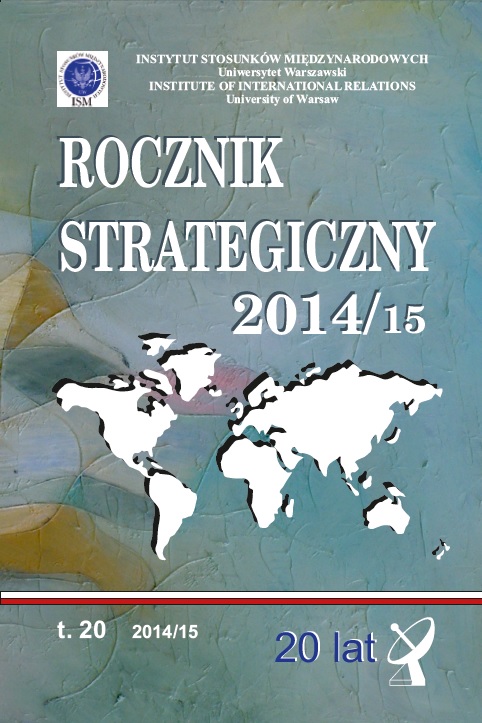Europa Wschodnia i Kaukaz południowy - pomiędzy hard power Rosji i soft power UE
EASTERN EUROPE AND SOUTH CAUCASUS - BETWEEN RUSSIA'S HARD POWER AND EU'S SOFT ONE
Author(s): Andrzej SzeptyckiSubject(s): Politics / Political Sciences, Politics, International relations/trade
Published by: Wydawnictwo Naukowe Scholar Sp. z o.o.
Keywords: war in Ukraine; annexation of Crimea; revolution of dignity; association agreement Ukraine-European Union; association agreement Georgia-European Union; association agreement Moldova-European Union
Summary/Abstract: In 2014 the situation in Eastern Europe and South Caucasus was largely definedby the Ukrainian crisis and the growing competition between the West (mainly theEuropean Union) and the Russian Federation. The “revolution of dignity” in Ukrainebrought to power its leaders, Arseniy Yatseniuk, who became the prime minister, andPetro Poroshenko, elected president of the country. Their political mandate was confirmedby anticipated presidential and parliamentary elections. The new team decidedto sign an association agreement with the EU, rejected by the previous Ukrainianregime. This decision was badly received by Russia, which responded by invadingand annexing Ukrainian Crimea and launching a proxy war in the eastern part of thecountry, in Donbas. If the annexation of Crimea was relatively peaceful, the conflictin Donbas left more than 6000 people dead. The conflict in Ukraine contributedto serious degradation of the relations between Russia and the West, and wasperceived as a threat by most of the countries in the region. Belarus, although memberof the Russia-launched Customs Union, tried to strengthen its international positionthrough the “Minsk agreements”, which unsuccessfully aimed to bring peaceto eastern Ukraine. Moldova and Georgia signed association agreements with theEU; in the former, despite the Russian pressure, the parliamentary elections gavea thin majority to the pro-European forces, in the latter the “Georgian Dream” coalitionstrengthened political repressions against the opposition and opted for a moderaterapprochement with Russia. Azerbaijan focused on strengthening the authoritarianregime, giving up priority relations with the West in favour of cooperationwith Russia and Turkey. It also aimed at escalating the conflict with Armenia overNagorno-Karabakh. The former, after deciding to join the Customs Union, accepteda gradual subjugation by Russia.
Journal: Rocznik Strategiczny
- Issue Year: 2014
- Issue No: 20
- Page Range: 236-256
- Page Count: 20
- Language: Polish

